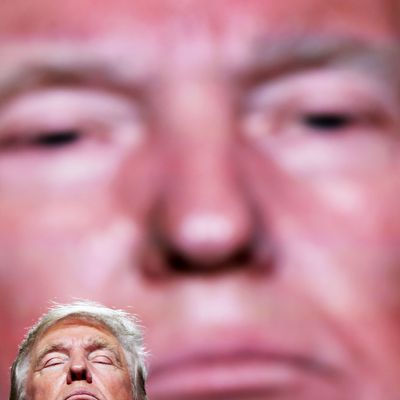
One fact that has grown bracingly clear over the course of the presidential campaign is that the campaign is not about any of the normal issues in American politics, but about democracy. The other elections we all remember have pitted two small-d democrats against each other. This one pits a small-d democrat against a candidate who has repeatedly stated that strong leaders crush their enemies, who warns without evidence that Antonin Scalia was murdered and that the election will be “rigged,” who threatens retaliatory policy crackdowns on owners of newspapers whose coverage displeases him, who has asked Russia’s autocrat to conduct a cyberattack on his opponent, and who, today, exhorted his audience to violent insurrection.
The democracy question has opened a deep schism within the Republican Party. Republicans stand mostly united on ends but divided on means. Trump’s somewhat amorphous promise to negotiate better trade deals aside, the candidate has mostly endorsed traditional Republican policies on taxes, regulation, judicial appointments, and so on. The division lies between the Paul Ryan wing of the party, which is focused on passing regressive debt-financed tax cuts through peaceful electoral means, and the Trump wing, which proposes regressive debt-financed tax cuts through peaceful means if possible, but through the trampling of democratic norms if necessary.
The two wings co-exist uneasily, as one might expect, but the more curious question is how they co-exist at all. Peter Beinart explores the fascination some right-wing intellectuals have with authoritarianism, and finds a psychological attraction to the energy and putative legitimacy of the people as an imagined unified force. Another source of overlap is a distrust of democracy on the libertarian right.
Ayn Rand’s theories have had enormous influence on the conservative movement and on leaders like Paul Ryan. Rand’s theories are a kind of inverted Marxism. Like Marx, she depicts society as riven between a producer class and a parasite class, but she identifies the classes in opposite terms. Rand’s producers are the capitalists, and the parasites who leech off them are the workers. (“The man at the top of the intellectual pyramid contributes the most to all those below him, but gets nothing except his material payment, receiving no intellectual bonus from others to add to the value of his time. The man at the bottom who, left to himself, would starve in his hopeless ineptitude, contributes nothing to those above him, but receives the bonus of all of their brains.”) But since the virtuous producer class amounts to a small minority, it is helpless before the majority that is able to confiscate their rightful earnings through democratic means. Democracy, by this way of thinking, poses a constant threat of enabling redistribution from the few to the many.
This is the notion that undergirds the otherwise puzzling habit on the right of depicting any discussion of the distributional ramifications of policy as “class warfare.” It is likewise the spirit of a long-standing apocryphal quote, repeated by conservatives like Ronald Reagan, that “a democracy cannot exist as a permanent form of government. It can only exist until the voters discover they can vote themselves largesse out of the public treasury.”
Peter Thiel, the libertarian investor who spoke for Trump in Cleveland, wrote in the libertarian Cato Institute’s journal in 2009, “I no longer believe that freedom and democracy are compatible. … For those of us who are libertarian in 2009, our education culminates with the knowledge that the broader education of the body politic has become a fool’s errand.” The Heritage Foundation’s Stephen Moore, who has advised Trump, has admitted, “Capitalism’s more important than democracy. I’m not even a big believer in democracy. I always say that democracy can be two wolves and a sheep deciding what to have for dinner.”
Not all libertarians think this way — most despise Trump, in fact — nor should these statements be taken as a straightforward endorsement of autocracy over democracy. What they show, instead, is an unease about (small-d) democratic economic policy. This helps explain why, of all of the factions in the GOP, the economic right has reconciled itself so easily to its nominee. Ryan’s spokesperson cheered Trump’s Ryan-like economic plan yesterday. Brian Ballard, a former Jeb Bush donor who now serves as Trump’s finance chair in Florida, stated accurately that repeal of the estate tax, which affects only inheritances over $11 million per couple, is “the linchpin of the conservative movement,” and hence a sign of the nominee’s close adherence to party doctrine. It also helps to explain why a clear bright line between virtuous respect for democratic norms and a dangerous willingness to flout them might present itself to the party of Trump and Ryan as something less than a perfectly clarifying choice.






























